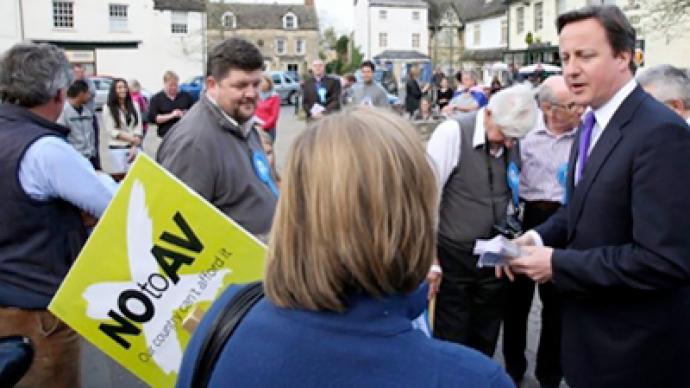Britain votes on voting

An alternative-vote referendum is being held in the UK which could see one of the oldest democracies in the world change the way it elects its MPs. The referendum has already sparked fierce debate among British politicians.
The British are to decide whether to change the current system of electing members of the House of Commons for the alternative voting system, or AV, which ranks candidates in order of preference. Traditionally, the parliament members are elected under the "first-past-the-post" (plurality) system, in which the seat in the parliament goes to the candidate who gets the majority of votes in the constituency. There is no requirement that the winner gain an absolute majority of votes. Such system in used in many countries, including the US and Canada.It is believed the AV electoral system will increase the number of parties represented in the parliament, opening its doors to parties that are quite popular in the country as a whole, but do not have real support bases in specific regions. Also, If the system gets the population’s approval, such organizations as the Green Party, Scottish National Party and the Party of Wales may get more influential in the country's parliament.
Member of the European Parliament William Dartmouth from the UK Independence Party thinks that the AV system is suitable for the UK and it is also more “responsive to the need of the elector of the 21st century.” "First-past-the-post" works rather well when there are two dominant parties as there were in Britain in 1950s. It does not work very well when we have a multi-party system, which we do in the UK at the moment,” explains Dartmouth. “It (AV) is a simple system of ranking, which is used for most elections: for trade unions, clubs, the speaker of the House of Commons, the mayor of London.”
However, many Conservatives, who are in power at the moment, are strongly against the AV system. The UK Prime Minister David Cameron compared the alternative voting system to a "life-support machine" for dead government. Cameron said AV was unfair, undemocratic and "hopelessly unclear", adding that, "if we’d used AV at the last election, there would be the chance, right now, that Gordon Brown would still be prime minister," as quoted by Dailymail.co.uk.The referendum was one of the conditions of the Conservative–Liberal Democrat coalition created after the 2010 general election.The AV cross-country referendum is only the second referendum in British history. The first one was conducted in 1975, when the UK decided to join the European Economic Community. Ekaterina Zatuliveter, an RT contributor in the UK, believes the stir around the AV vote is exaggerated by the politicians.“The AV is simply an upgraded version of the existing first-past-the-post system. And the voters understand it. That’s why there is such a low interest in this referendum among the public,” says Zatuliveter.












